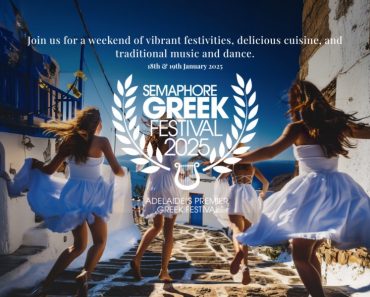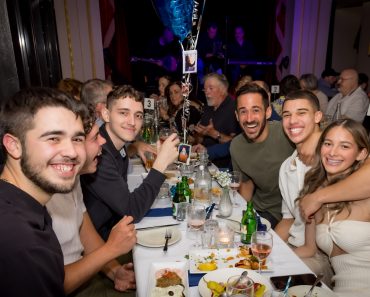Jon Yiannis Escobar’s yiayia and papou did more than help raise him, they introduced him to Greek cinema.
For the 23-year-old Greek Colombian filmmaker, this moment shaped the course of his artistic journey.
His short film, Red Cloth, a psychological thriller set in the past “explores the dangers of obsession and serves as a nuanced allegory for the stages of grief.”
The works of Greek filmmakers like Theodoros Angelopoulos, Yorgos Tzavellas and John Cassavetes have had significant impact on him.
Inspired by European horror and avant-garde cinema, Escobar uses “ambiguity and emotional complexity” to both “challenge and intrigue audiences.”
“My films often explore psychological themes such as grief and obsession, blending reality and fantasy in visually immersive, dreamlike worlds,” Escobar told Neos Kosmos.

The psychological layers of Red Cloth
Red Cloth is influenced by the works of David Lynch, Lars von Trier, and Yorgos Lanthimos, the film follows Kenneth’s journey through “denial, guilt, and the ways the subconscious can unravel reality.”
Escobar aimed for the narrative to be open to interpretation, allowing the “audience to form their own conclusions.”
“Ambiguity, to me, holds a certain poetic power—it reflects the complexity of the human experience and engages the viewer as an active participant in the story.”
“Transforming contemporary locations into a believable 1960s landscape” required extensive collaboration – a challenge Escobar admitted he was drawn to.

Escobar says that capturing the “mid-century aesthetic with authenticity required painstaking attention to detail and an embrace of visual effects to restore what time and urbanisation have erased.”
Escobar has experimented beyond filmmaking, he directed a series of music videos for alternative electronic pop artist Marceline’s latest release.

In the music video for her single Evil, inspired by late 1970s European horror, “visually ambiguous elements blur the line between fiction and reality.”
For experimental Marceline’s music video, 3AM, Escobar said they “took a more spontaneous and approach,” in contrast to “the more stable, locked-off visuals of Evil.”
“Marceline and I initially bonded over our shared Greek heritage, which only deepened our creative connection throughout these projects.”

Exploring Greek identity
From a young age, Escobar “was immersed in Greek culture, through the music, art, and films” he was exposed to.
Surrounded by Hellenic paintings and Byzantine art at his grandparents’ house, he said the “colour palettes, intricate patterns, and powerful imagery” continue to influence his creative vision to this day.
“I often find myself drawing on these visual elements in my work, attempting to capture the same depth and emotion that resonated with me during my childhood.”

Last year, “in hopes of connecting more deeply” with his heritage, Escobar travelled to Greece.
There, he was “stunned” by a perspective he had never considered before.
While in Athens, Escobar was approached by a production house after his work was featured on Kodak’s Instagram and other platforms.
During a visit to their studio, Escobar was “surprised” to learn that his Australian production style is considered “unfeasible” in Greece due to limited budgets and resources.

“Historically, Greece has been a cradle of art and culture, with creativity embedded in our collective identity.”
“This conversation” forced him “to reflect on the state of Greek representation in the arts, both in Greece and within the diaspora.”
Challenging stereotypes
In Australia, Escobar said, there is “a disparity when it comes to Greek representation in filmmaking.”
“Within our community, there seems to be a lack of encouragement and inspiration for young Greek creatives to pursue careers as writers or directors.”
He believes this imbalance stems from public stereotypes that limit the “recognition of Greek artists as storytellers with unique, multifaceted perspectives.”

The issue “is exacerbated by the prevalence of ‘tall poppy syndrome,’ where those who strive to excel are often discouraged or undervalued.”
Despite the Greeks in Australia having access to resources, funding, and innovative tools, Escobar feels these opportunities are often taken “for granted.”
“It’s essential for us to create authentic, nuanced Greek narratives that hold a mirror up to the complexities of our culture—stories that go beyond the comedic stereotypes perpetuated by mainstream media.”

The art of inspiration
Escobar believes “filmmaking is not merely about confronting problems, dilemmas, and fears.”
“It also involves embracing the nuances of life’s quiet moments—its dreams, its secrets, its fleeting memories.”
For him, inspiration often begins with a single image: a face illuminated by soft light, a subtle gesture, a quiet moment like elderly women sitting apart on a bench, or an intimate conversation.
These fragments, he said, “attach themselves to my creative process like brilliant fish caught on a line.”
“I find myself drawn to that line, whose texture and meaning I may not fully comprehend, but whose pull I am willingly guided by.”

Shifting focus from music videos, Escobar is now drawn to fashion films, where he believes his “surrealist tendencies can create an intriguing contrast with the world of fashion.”
He recently completed a fashion film for the Melbourne-based brand “Change,” aiming to blend “primitivity with innovation,” a theme he feels is “often overlooked in contemporary fashion films.”
Looking ahead, he expressed excitement about the prospect of creating his first feature film “when the timing feels right.”
“Narrative work, especially on a larger scale, is a natural next step for me, and I’m eager to take that leap when the opportunity arises.”







